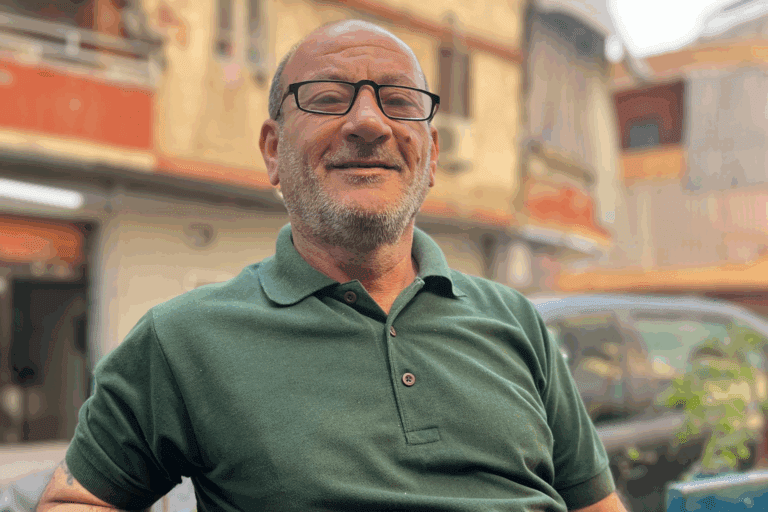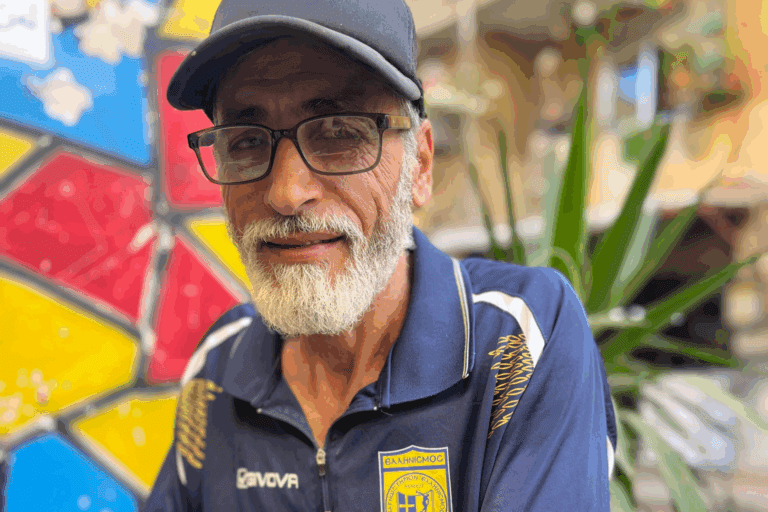These are the stories of Hussein and Mohammad, two older men displaced by war and struggling with health issues, poverty, and the uncertainty of growing older without support. Thanks to IDRAAC—a member of the HelpAge global network—they received critical assistance. But their stories reflect the ongoing need for age-inclusive humanitarian aid and long-term social protection.
Stories like Hussein’s and Mohammad’s are a stark reminder that older people are among the most at-risk during crises. They need tailored support, dignity, and inclusion. That’s why HelpAge continues to advocate for age-friendly policies and humanitarian responses that leave no one behind.
"I just want my family to be happy": Hussein's story
Hussein never imagined he would be starting over from scratch.
“I used to live in the south of Lebanon with my wife and children,” he says. “But our home was destroyed during the recent war, forcing us to flee with nothing.” Life isn’t what it used to be. Everything has changed.”
Now internally displaced, Hussein and his family are trying to rebuild their lives in Burj Hammoud, a neighborhood in Beirut. But it’s not easy. He is living with diabetes, and the strain of displacement has only worsened his health.
“As I get older, I feel my body failing me,” he admits. “But I try to stay strong for my family.”
Local organizations such as HelpAge global network member IDRAAC stepped in when they needed it most, providing essentials like blankets, mattresses, and food. “They even held psychosocial support sessions for my wife and other women in the neighborhood. My son, who is 10, took part in football games. He’s happy here. That makes me happy as well.”
But Hussein carries a heavy burden. His wife works as a housekeeper, but their income isn’t enough. “I can’t pay rent. I can’t afford to buy my children the things they need. That breaks me. If I can give them what they need, I will be happy. That’s all I care about—my family’s happiness.”
For Hussein, like many older people in Lebanon, the future is uncertain. “We have nothing secured. If we get sick, there’s no one to help. No medicine. The government is absent.”
Still, he holds onto one hope: to return home.
“I feel grateful here, but I want to go back to the south. I want to rebuild my life. We will never forget how the people here welcomed us. And one day, I hope to welcome them into my home in the south.”

"I only have hope for my children": Mohammed's story
Mohammad lives in a single room with his wife and three children. There’s no kitchen. No privacy. And for now, no way out.
“I’m sick,” he says quietly. “I have constant back pain and need injections all the time. But I can’t find work to pay for them. I can’t give my family what they need.”
Displaced from the Bekaa to Beirut by the recent conflict, Mohammad’s daily life is defined by scarcity and struggle. “War affects the poor and the old the most,” he says. “We were not afraid during the war – but it changed everything.”
When they arrived in Beirut, HelpAge global netork member IDRAAC stepped in. “They gave us food, blankets, even some financial support. We’re very grateful.”
But the challenges persist. “We are five of us living in one room. What do I need now? Peace. Safety. A job. That’s all.”
Mohammad’s voice trembles when he speaks about growing older in Lebanon. “When we get old, we feel useless. There are no laws for older people. No financial support. No one to take care of us. Growing old here feels like a punishment.”
“I don’t want anything for me. I want to secure my wife and children. I want them to live better than this.”
When asked if he still has hope, he pauses. “No. Not for me. I just hope to go back home. I just want to find a job. That’s all I ask.”

